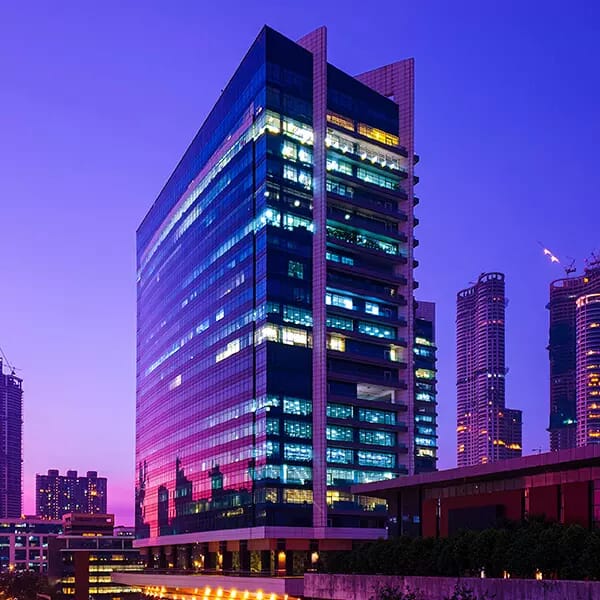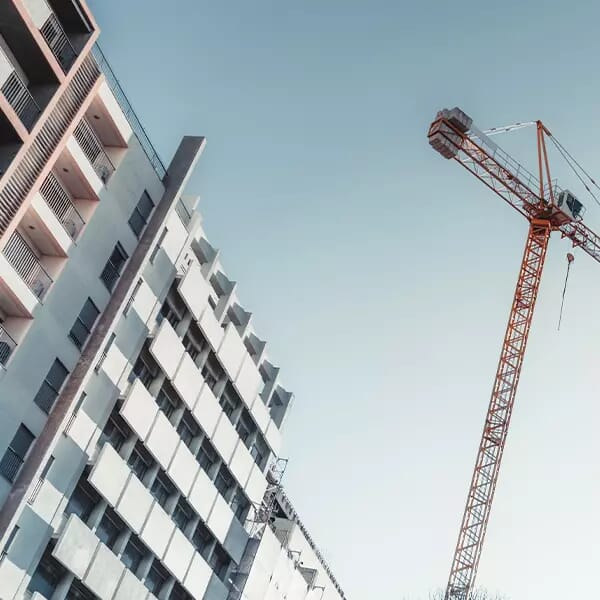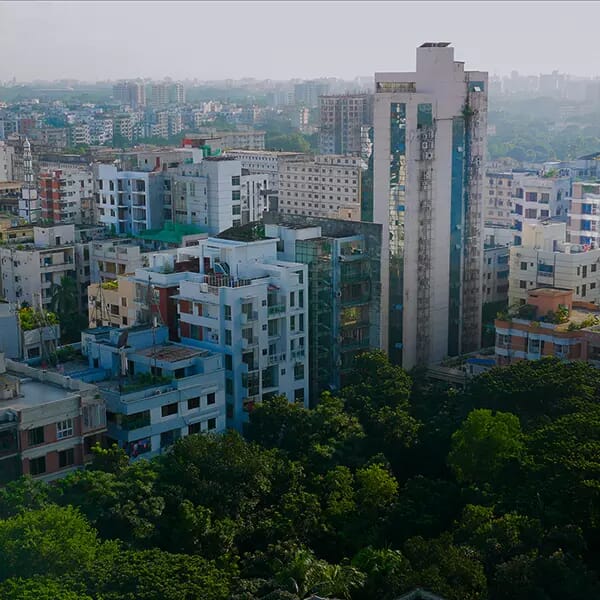 Credit: Natali Glado / Shutterstock
Credit: Natali Glado / ShutterstockMeasuring the Last Mile - German Logistics in 2023
Key takeaways from the Urban Logistics Trends GRI Hybrid Club Meeting
February 13, 2023Real Estate
On February 9th, the leading investors, project developers, and lenders active in the German logistics sector joined online and in person for a GRI Hybrid Club Meeting to discuss the latest news and trends in urban logistics. Moderated by Philipp Feige from co-host Prologis and with Danilo Hunker (Arrow Capital), Lars Bothe (Mirastar), Oliver Kemper (Verdion), and Jan Hempel (Garbe) acting as Co-Chairs, the event took place in Berlin with virtual attendees from across Europe. The participants took the opportunity to cover a range of topics including investor interest, capital lending, last mile logistics, as well as population density and urbanisation.
To improve the opinion of the population living near logistics assets, the attendees examined the possibility of the industry aligning with ESG strategies and addressing issues that currently create the most concern for the population. Other countries, including the Netherlands, are leading in ESG-friendly logistics assets, largely due to regulatory factors. Inner-city logistics presents additional complexity, including neighbour and tenant concerns, permit and development restrictions, and differing regulations in each location. Despite these issues, the sector continues to attract capital as rental growth outpaces other assets such as residential.
Each group may have a different definition of Last Mile Logistics (LML), but they are all united by the key concern of delivery times, especially with regards to the importance of achieving next-day deliveries. Logistics is not isolated and there is competition from other asset classes, particularly in inner cities where residential asset permits may be given preferential treatment. As one member observed, it is worth considering the possibility of shops (supermarkets, department stores, etc) becoming a part of LML and possibly even new providers.
The success of last mile strategies in urban areas depends on factors such as population growth, potential customers/tenants, and the ability to adjust to the market. The goal is to identify locations that are capable of reaching the greatest number of end-customers, while keeping in mind that the type of assets are likely set to change based on the specific locale.

Institutional investors and funds are increasingly prioritising investments in ESG-compliant assets, which could create challenges for the market due to an excess number of non-compliant brownfield assets available. The pressure to invest in ESG-compliant assets is even greater than before as some funds are unwilling to purchase assets that do not meet the relevant standards, even if it means paying a higher price. The potential for stranded assets is a concern for the future of the sector.
The GRI Club members also discussed how the future of urban logistics may see a shift towards mixed-use developments and the repurposing of unused parking lots and retail spaces as LML assets. Repositioning retail spaces appears to be an attractive prospect because they often already include storage and warehouse spaces that can easily be transformed into last mile assets This change could attract new investors to the logistics industry. Automation is expected to become a major factor, potentially leading to job cuts down the line. Indoor farming is not expected to significantly impact the logistics sector, but may be incorporated into certain assets.
With innovative technology, experienced professionals, and a commitment to efficiency and sustainability, the German logistics sector remains at the forefront of the industry. But as the field evolves and new challenges arise, it is crucial to stay up to date on the latest developments and plan for the future alongside an exclusive group of industry peers. There’s no better destination to achieve these goals than at Deutsche GRI 2023, taking place on May 3-4 at The Westin Grand Frankfurt in Frankfurt am Main - secure your ticket now!
Written by Rory Hickman
The Look of Logistics
The negative perception of the logistics market, especially with regards to the impact on local residents, can create difficulties in securing spaces and products. To overcome this challenge, the executives suggested undertaking lobbying and marketing efforts to improve the perception of logistics assets. It has been observed that saturation is starting to occur in some areas in Germany, but there is an important differentiation to be made between saturation for clients and saturation from a political perspective.To improve the opinion of the population living near logistics assets, the attendees examined the possibility of the industry aligning with ESG strategies and addressing issues that currently create the most concern for the population. Other countries, including the Netherlands, are leading in ESG-friendly logistics assets, largely due to regulatory factors. Inner-city logistics presents additional complexity, including neighbour and tenant concerns, permit and development restrictions, and differing regulations in each location. Despite these issues, the sector continues to attract capital as rental growth outpaces other assets such as residential.
How Far is the Last Mile?
According to club members, the definition of "Last Mile" can vary greatly depending on the perspective of which group you ask. For occupiers and 3PLs, it likely refers to central areas of cities, while developers and investors are seeing the last mile move further outside cities due to the difficulty of securing larger assets around the centre. The definition of last mile may be better classified by use case rather than by location.Each group may have a different definition of Last Mile Logistics (LML), but they are all united by the key concern of delivery times, especially with regards to the importance of achieving next-day deliveries. Logistics is not isolated and there is competition from other asset classes, particularly in inner cities where residential asset permits may be given preferential treatment. As one member observed, it is worth considering the possibility of shops (supermarkets, department stores, etc) becoming a part of LML and possibly even new providers.
The success of last mile strategies in urban areas depends on factors such as population growth, potential customers/tenants, and the ability to adjust to the market. The goal is to identify locations that are capable of reaching the greatest number of end-customers, while keeping in mind that the type of assets are likely set to change based on the specific locale.

The Logistics of ESG
The current ESG focus in the logistics industry mainly concerns improving existing assets rather than building new ones. Energy efficiency remains a major issue, as do social factors such as the working conditions of delivery and warehouse personnel and how they can contribute to keeping talent away from the sector. Improving working conditions and reducing employee turnover could bring benefits to customers and third-party logistics providers, but this may be difficult to convey to tenants. Changes to delivery price points could see LML pushed further into city centres.Institutional investors and funds are increasingly prioritising investments in ESG-compliant assets, which could create challenges for the market due to an excess number of non-compliant brownfield assets available. The pressure to invest in ESG-compliant assets is even greater than before as some funds are unwilling to purchase assets that do not meet the relevant standards, even if it means paying a higher price. The potential for stranded assets is a concern for the future of the sector.
Berlin and Urban Trends
Focusing close to home for the in-person attendees, the well-known complexity of operating in Berlin - with its complex bureaucracy and numerous political obstacles - could be eased somewhat as a result of steps being taken by the city to support logistics industry development by setting aside certain areas specifically for commercial use. This could create new opportunities for developers in the field, allowing them to grow and flourish in the city.The GRI Club members also discussed how the future of urban logistics may see a shift towards mixed-use developments and the repurposing of unused parking lots and retail spaces as LML assets. Repositioning retail spaces appears to be an attractive prospect because they often already include storage and warehouse spaces that can easily be transformed into last mile assets This change could attract new investors to the logistics industry. Automation is expected to become a major factor, potentially leading to job cuts down the line. Indoor farming is not expected to significantly impact the logistics sector, but may be incorporated into certain assets.
With innovative technology, experienced professionals, and a commitment to efficiency and sustainability, the German logistics sector remains at the forefront of the industry. But as the field evolves and new challenges arise, it is crucial to stay up to date on the latest developments and plan for the future alongside an exclusive group of industry peers. There’s no better destination to achieve these goals than at Deutsche GRI 2023, taking place on May 3-4 at The Westin Grand Frankfurt in Frankfurt am Main - secure your ticket now!
Written by Rory Hickman







